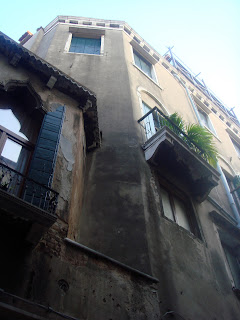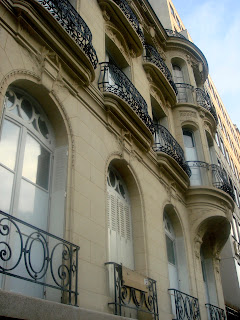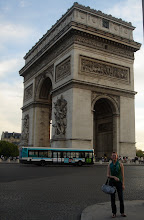When we were in Venice in 2010, our hotel offered an
excursion to the island of Murano. The island is world-renowned for its glass
production, and the monopoly on European glass fabrication was held by Murano
artisans for centuries. Many of the glassmaking factories on Murano have been
in existence for hundreds of years; the one we visited had a family tree
hanging in the workshop and the factory itself dated back to the twelfth
century.
When our boat docked on Murano, we were led into the factory
for a glassmaking demonstration. The proprietor, who wasn’t a member of the
family, was an Italian guy named Frank. He had a long, blonde ponytail and was
very tan. He looked exactly like the Beast in Disney’s Beauty and the Beast after he turns into a human again.
The glass demonstration was really interesting. It was neat
to learn that the process has remained the same for hundreds of years and has
been passed down from generation to generation. I did wonder though if the
artists got annoyed with people watching them all day. I don’t think I could
concentrate on my work if there were tourists gawking at me and taking photos. Maybe
they’re just used to it though. After the demonstration, we were taken into the
gallery where we could peruse (and as they hoped, shop) various forms of glass
art. There were statues, vases, drinking glasses, plates, boxes, and
chandeliers—basically, anything you could imagine was in that gallery—and
ranged in size from miniscule (figures the size of an earring) to massive (glass
chandeliers weighing several tons). Our group walked through the gallery and
looked at everything, but because of the exorbitant price tags, hardly anyone
was seriously considering buying anything. The exception was a group of loud
Americans who were buying very ugly clown statues (WHY?). There was also a
group of Russians who looked as if they were members of the mafia. They looked
loaded. I can’t remember what they were buying.
R and I joked around saying that we should add a set of
eight Murano drinking glasses to our wedding registry. At the very inexpensive
price of 700 Euros, the glasses were a bargain! Frank, who was hovering around
eavesdropping, got wind of our conversation and thought we were serious. He
latched on and went into the back and brought out all sorts of glasses in
different styles. Although we kept telling him we were students and couldn’t
afford such expensive glasses, he persisted and tried to get us “a cheaper
price because we were so nice.” As Robin pointed out later, the fact that I had
my Louis Vuitton purse didn’t help; Frank was determined to sell us whatever he
could and didn’t believe us when we said we weren’t rich.
As Frank kept bringing out products, everyone disappeared, including
the clown-buying Americans and the members of the Russian mafia. I was starting
to get really uncomfortable because we were in the glass showroom totally alone
with Frank, who more than likely worked on commission and seemed hell bent on getting
us to buy something. When he finally realized we weren’t buying anything from
him, he started telling us a story about people he knew in Texas and how we
should meet up with them. What? He then told us about his friend who sold her
wedding dress to someone in the United States without receiving payment for the dress first. The friend was distraught
and surprised when the money for the dress never arrived. Frank was ranting
about people being crooks while we slowly edged our way to the door. After
Frank gave us his business card and contact info, and we assured him if we were
ever in the market for expensive glassware we would call him, we extricated
ourselves and ran from the factory to a little gift shop where the exit was.
The whole tour had taken about an hour and a half.
Occasionally we still talk about Frank and wonder what he's doing. If we ever go back to Murano I think we'll go back to the same glass factory just to see if Frank's still there. I wonder if he'd recognize us?































































